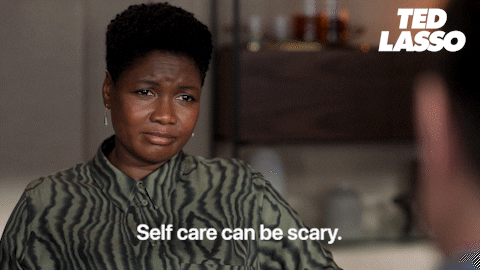Why it’s hard to treat yourself when you need it most
Plus, the hidden benefits of art
“When we are complaining, we are increasing the extent to which we see things with an external locus of control. We are essentially saying, the world happens to me and there's nothing I can do about it. When we talk to somebody who reframes, they're helping us give us that internal locus of control, helping us see that we are an agent, that there are ways to move forward to fix the situation.” – Michael Baer
BRAIN WAVES
A gift from me to me. We all deserve the occasional treat – or lots of treats. But ironically, we may find it hard to treat ourselves when we’re most in need of some TLC. In a new study, volunteers were presented with an ad for a pair of headphones. For half the participants, the ad encouraged what researchers called “self-gifting.” In other words, they urged people to “carve out me-time” or “create a special moment.” As it turned out, when people felt more stressed about the various commitments in their lives, they were less interested in the headphones that came with self-gifting language. They were also less interested in trying them out, saying they wouldn’t have time to enjoy them. It wasn’t just buying stuff – when people were more stressed, they spent less time on fun or pleasurable activities. “For example, if you were offered an opportunity to get a massage during a particularly busy time of year, would you do it? We find probably not,” said Jaqueline Rifkin, the study’s lead author. “My hope is that understanding these findings can help people challenge some of their internal narratives about when is vs. isn’t a good time to do something for yourself.”
Art therapy. We tend to think of art as a luxury. But considering its many benefits to our mental health, art might be more essential than we think. At Discover magazine, science writer Carla Delgado cites a number of studies that suggest there are big benefits to viewing art. It can reduce stress and anxiety, decrease blood pressure, and fire up the pleasure networks in our brain. Art “provides an opportunity for people to learn and find meaning or inspiration in their lives,” Delgado writes. She includes tips for making the most out of your next trip to a gallery or museum.
The power of rituals. What are some of your daily rituals? In this episode, we explore the psychological power behind the sacred and secular rituals that structure our lives. Listen to learn more.
ON THE HIDDEN BRAIN PODCAST
Dec 19: Nobody likes a complainer. Yet almost all of us complain. Why is complaining such a ubiquitous part of our lives? And how can we learn to complain more productively?
ON THE MY UNSUNG HERO PODCAST
Dec 20: When Stephanie got overwhelmed on the first day of her very first job, a customer shared some kind words.
Don’t forget to send us the story of your unsung hero! Record a voice memo on your phone and email it to myunsunghero@hiddenbrain.org.
MIND GAMES
One family wants to get through a tunnel. Dad can make it in one minute, mom in two minutes, son in four and daughter in five minutes. No more than two people can go through the tunnel at one time, moving at the speed of the slower one. How can they all make it to the other side if they have a torch that lasts only 12 minutes and they are afraid of the dark?
LAST WEEK’S PUZZLE
What occurs once in every minute, twice in every moment, yet never in a thousand years?
The answer: The letter M.
FROM THE TWITTERATI…
A MOMENT OF JOY
Have an idea for Hidden Brain? A story you want to share with us? Send an email to ideas@hiddenbrain.org. And if you’d like to support our work, you can do so here. Listen to us on Spotify, Apple, Amazon Music or your favorite podcast platform.





